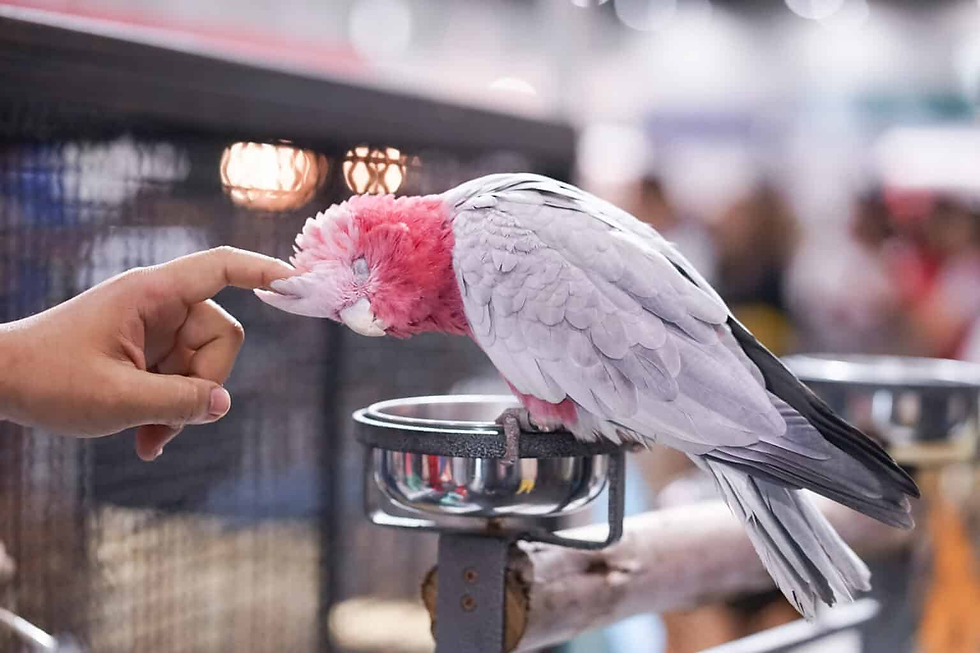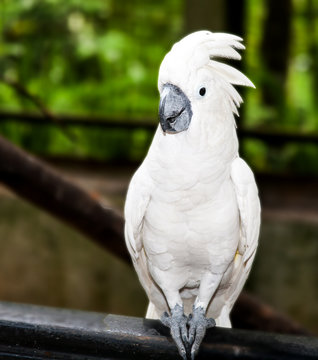Cockatoo Enrichment Ideas: Keeping Your Bird Happy & Stimulated🦜
- Iqra Shaikh
- 1 day ago
- 3 min read
📌 What This Blog Contains
🧠 Understanding Cockatoo Intelligence
Cockatoos are among the most intelligent birds in the parrot family. Their ability to solve puzzles, mimic sounds, and emotionally bond with humans is unmatched. They’re not just reacting to the environment — they’re thinking, feeling, and adapting.
Scientific studies have shown cockatoos can use tools, plan actions, and even demonstrate empathy with their flock or favorite humans.

💞 Emotional Sensitivity in Cockatoos
Cockatoos are emotionally intense. They don’t just crave attention — they require it.
Highly social: They bond deeply with their humans and can suffer from loneliness if neglected.
Mood mirrors: A stressed or anxious owner can often trigger the same behavior in a cockatoo.
Separation anxiety: Leaving them alone too long can lead to destructive behaviors like feather plucking.
They feel more than most people realize. Treating them with respect and care is essential for their well-being.
🤪 Behavioral Quirks & Communication
From head bobbing to dramatic vocalizations, cockatoos are loaded with personality.
Here’s what some common behaviors mean:
Crest up: Alert, excited, or startled
Foot tapping: Playfulness or sometimes irritation
Feather fluffing: Comfort or preparation for rest
Screaming: Can be excitement, boredom, or stress
Beak grinding: Relaxation, especially before sleep
Understanding these cues helps you communicate better and avoid misinterpretation.
🧩 Enrichment & Mental Stimulation
Boredom is your cockatoo’s worst enemy. A mentally unstimulated bird becomes noisy, aggressive, or even self-destructive.
Enrichment tips:
Rotate interactive toys weekly
Create foraging puzzles with food
Allow supervised out-of-cage time daily
Introduce training games to build trust
Place the cage near activity (but not stress-heavy) zones
Their minds thrive on new experiences — the more stimulation, the better their behavior.
🐾 Training & Bonding
Cockatoos love interaction. Training isn’t just about control — it’s about bonding.
Clicker training, targeting, and step-up practice help shape behavior and build mutual trust. Always use positive reinforcement — treats, praise, or favorite toys.
Avoid yelling or punishment. They remember bad experiences and can become fearful or withdrawn. Be consistent, patient, and kind.

❤️ Final Thoughts
Cockatoos aren’t just pets — they’re emotional partners with immense intelligence and deep sensitivity. Understanding their unique behaviors and emotional world helps build a relationship rooted in trust, enrichment, and lasting companionship.
If you're ready for a loud, loving, sometimes demanding best friend, a cockatoo will return that love tenfold.
💡 Pro Tip
If your cockatoo screams excessively, don’t yell back — it reinforces the behavior. Instead, quietly walk away and reward calm behavior with attention or a treat.
✅ Summary
Cockatoos are intelligent, emotional, and full of character. They thrive on social interaction, mental stimulation, and positive training. By understanding their behavioral cues and providing enriching environments, you’ll create a deep and loving bond with your feathered friend.
❓ FAQs for Cockatoo Behavior & Intelligence
1. Are cockatoos smarter than other parrots?
Yes, cockatoos are considered among the most intelligent parrot species. Their problem-solving abilities and emotional awareness set them apart.
2. Why is my cockatoo screaming so much?
It could be boredom, attention-seeking, or stress. Ensure they’re mentally stimulated, not left alone too long, and have a routine.
3. Can cockatoos get depressed?
Absolutely. Lack of attention, social interaction, or stimulation can lead to depression — often shown through feather plucking or lethargy.
4. How do I know if my cockatoo trusts me?
Signs include gentle vocalizing, following you, letting you touch them, and even mimicking your tone or words.
5. What’s the best way to bond with a cockatoo?
Spend consistent quality time, offer treats, talk softly, and play interactive games. Avoid forced handling and always go at their pace.
👉Read next:
Also Small mammal lover?
Check out our ultimate small & unusual mammal care guide
Follow us on:



Comments